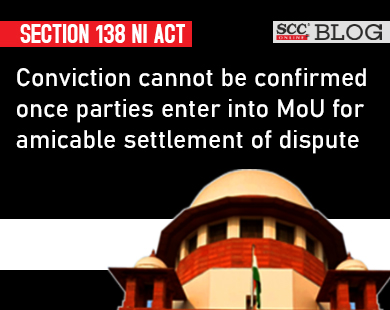Supreme Court: In a case falling under Section 138 of the Negotiable Instruments Act, 1881, the bench of Krishna Murari and V. Ramasubramanian, JJ has set aside the conviction by the Trial Court and has held that the Telangana High Court could not have confirmed the conviction when the parties had entered into a Memorandum of Understanding for amicable settlement of dispute, leading to compounding the offence.
In the case at hand, allegedly, the Appellants, under the guise of making investments took money from Respondent No. 2 and made wrongful gain for their profits. Hence, on a private complaint initiated by the Respondent No. 2, proceedings under Section 138 of the Negotiable Instruments Act, 1881 were initiated against the Appellants which to the conviction of the Appellants by the trial court.
After this, a revision was preferred by the Appellants in the High Court. However, during the course of the revision, the parties entered into a Memorandum of Understanding to settle the dispute within themselves. As per the terms of the agreement, the Respondent No. 2 was bound to file a compromise petition before the High Court, however his failed to do so, led to the High Court dismissing the Revision and confirming the Conviction of the Appellants.
The Supreme Court, disagreed with the High Court’s order and observed that the parties were bound by the terms and conditions of the settlement to settle the dispute amicably, or through an arbitration as stated in the Memorandum of Understanding. In such a circumstance, the Appellants cannot be convicted on the basis of the orders passed by the courts below, as the settlement is nothing but a compounding of the offence.
The Court observed,
“This is a very clear case of the parties entering into an agreement for compounding the offence to save themselves from the process of litigation. When such a step has been taken by the parties, and the law very clearly allows them to do the same, the High Court then cannot override such compounding and impose its will.”
The Court, hence, set aside the conviction and kept open to the parties to settle their dispute as per the terms of the Memorandum Of Understanding.
[BV SESHAIAH v. State of Telangana, 2023 SCC OnLine SC 96, decided on 01.02.2023]
*Judgment authored by: Justice Krishna Murari
Advocates who appeared in this case :
For Petitioner(s): AOR M/S. M. Rambabu and Co., Advocates Mullapudi Rambabu, Prity Kumari, N. Eswara Rao;
For Respondent(s): AOR S. Udaya Kumar Sagar, Advocate Lakshay Saini.






